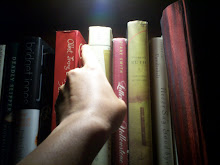The Homecoming sat on my bookshelf at college for six months collecting dust along with the other 15+ books I foolishly took with me to school thinking I would actually have time to read. I felt bad for not reading many (any) of them, but I felt extra-contrite about not reading this one for two reasons: 1) Because my dad gave me this book, and 2) Because the author is a good family friend of ours.
When I was a kid, Shashi Warrier (Shashi Uncle in our home) used to bring me drafts of his latest work in progress, the most memorable of which was a children's book by the name ofSuzy's Gift. With this and the several other novels he has written since, however, it is clear that Warrier has moved out of the whimsical (though greatly entertaining) sphere of kid's lit and into more grave and thought-provoking subject matter.
The Homecoming revolves around Javed Sharif, a rug-merchant, returning home to Srinagar, Kashmir for his elderly father's birthday. After a lifetime of working to support his family, Javed looks forward to retiring soon in his beloved hometown in spite of the violent wartime that has begun to make itself known in Kashmir. He is, at the onset of the novel, quite satisfied with his lot in life; he is fairly successful as a businessman, his three children (sons Irfan and Fawzi, and daughter Razia) are grown, and his relationship with his family is satisfactory. Javed surveys his life's work and perceives a job well done.
His peace, however, is disturbed when he and his younger son Irfan are arrested under suspected involvement with and sympathies for a brutal terrorist organization. This event, which occurs some twenty or thirty pages into the novel, kick-starts the action and drives the story to a desperate, wrenching ending. After a night in the local lock-up, Javed is released and cleared of all suspicion while his son is kept in detention. Though he knows it will cost him his retirement, Javed resolves to spend as much time and money as is needed to get Irfan out of prison. In a tale of pain, sacrifice, betrayal, and loss, Javed watches what he thought was a sturdy, healthy family life fall apart and, in a manner reminiscent of Arthur Miller's Death of a Salesman, suddenly finds himself without anything.
To me, this book epitomizes the sentiment of having the rug yanked out from under your feet. We begin with a settled, happy protagonist and end with a wholly different picture. Warrier does an excellent job of painting both portraits, and of illustrating the series of events that brings the characters from one to the other. He handles the matter of Irfan's guilt beautifully and, while never giving the answer outright, puts out enough choice pieces of information to provide the reader with a clear verdict by the end of the novel. He presents the reader with not just the story of a family, but also the story of a country at odds with itself and its people.
The Homecoming spares no details, no matter how harrowing they might be, and leaves the reader with a startlingly honest picture of not only the Kashmir conflict, but also of the brutal potential, the irony, and the unyielding force of human nature.
It was a slow read almost until the end, so don't go for this one expecting an action thrill of any kind. Because it was measured in pace, the plot allowed for a great deal of contemplation and speculation on the part of the reader. This is one I definitely recommend for older audiences, perhaps 16+, simply due to the heavy/dense subject matter. However, if you are a particularly precocious reader, nothing should stop you from reading this wonderfully moving, evocative novel.


hmmm, my comment evaporated - i was wondering if you think growing up with Sashi Uncle influences you as a writer?
ReplyDeleteLet's see...well, to be honest, I don't think so. I wouldn't say that I grew up with him, exactly. It was more along the lines of growing up with the idea of him. So, in that way, by being an adult who actually wrote for a living, he did influence me just by demonstrating that writing doesn't have to be an activity of idle fancy.
ReplyDeleteWe are quite different when it comes to stylistic tendencies, though.